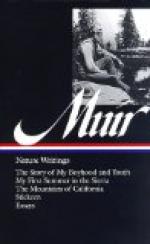Notwithstanding the great number of harshly enforced rules, not very good order was kept in school in my time. There were two schools within a few rods of each other, one for mathematics, navigation, etc., the other, called the grammar school, that I attended. The masters lived in a big freestone house within eight or ten yards of the schools, so that they could easily step out for anything they wanted or send one of the scholars. The moment our master disappeared, perhaps for a book or a drink, every scholar left his seat and his lessons, jumped on top of the benches and desks or crawled beneath them, tugging, rolling, wrestling, accomplishing in a minute a depth of disorder and din unbelievable save by a Scottish scholar. We even carried on war, class against class, in those wild, precious minutes. A watcher gave the alarm when the master opened his house-door to return, and it was a great feat to get into our places before he entered, adorned in awful majestic authority, shouting “Silence!” and striking resounding blows with his cane on a desk or on some unfortunate scholar’s back.
Forty-seven years after leaving this fighting school, I returned on a visit to Scotland, and a cousin in Dunbar introduced me to a minister who was acquainted with the history of the school, and obtained for me an invitation to dine with the new master. Of course I gladly accepted, for I wanted to see the old place of fun and pain, and the battleground on the sands. Mr. Lyon, our able teacher and thrasher, I learned, had held his place as master of the school for twenty or thirty years after I left it, and had recently died in London, after preparing many young men for the English Universities. At the dinner-table, while I was recalling the amusements and fights of my old schooldays, the minister remarked to the new master, “Now, don’t you wish that you had been teacher in those days, and gained the honor of walloping John Muir?” This pleasure so merrily suggested showed that the minister also had been a fighter in his youth. The old freestone school building was still perfectly sound, but the carved, ink-stained desks were almost whittled away.
The highest part of our playground back of the school commanded a view of the sea, and we loved to watch the passing ships and, judging by their rigging, make guesses as to the ports they had sailed from, those to which they were bound, what they were loaded with, their tonnage, etc. In stormy weather they were all smothered in clouds and spray, and showers of salt scud torn from the tops of the waves came flying over the playground wall. In those tremendous storms many a brave ship foundered or was tossed and smashed on the rocky shore. When a wreck occurred within a mile or two of the town, we often managed by running fast to reach it and pick up some of the spoils. In particular I remember visiting the battered fragments of an unfortunate brig or schooner that had been loaded with apples, and finding fine unpitiful sport in rushing into the spent waves and picking up the red-cheeked fruit from the frothy, seething foam.




